News
- By RFE/RL
Belarus Police Stifle Protests On Independence Day
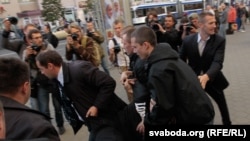
Photos And Videos Of The Protests From RFE/RL's Belarus Service
The website of RFE/RL's Belarus Service was also taken down for several hours by a suspected distributed denial of service (DDoS) attack. Other RFE/RL websites were also affected.
"We understand that the goal of these attacks is to sow uncertainty and turbulence, to destroy public consent, and, in the end, to bring us to our knees and to bring all the achievements of our independence down to zero. This is not going to happen," the Belarusian president said.
reporting by RFE/RL's Belarus Service. Written by Claire Bigg with agency reports
More News
Moldova Sets Elections For September 28 In Battle Between EU and Russian Camps
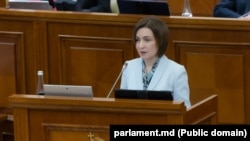
Moldova's lawmakers voted to set the next parliamentary elections for September 28 in a test for the country's fragile democracy caught between pro-European and pro-Russian forces.
A total of 57 lawmakers voted on April 17 to hold the elections on September 28, against 32 abstentions.
President Maia Sandu's pro-Western PAS party is expected to face a strong challenge from a three-party coalition led by her rival, Alexandr Stoianoglo.
The Harvard University educated, former World Bank official narrowly edged out Stoianoglo in a presidential election late last year.
Stoianoglo, a former prosecutor-general, will lead the coalition that says it wants to improve ties with Russia while also keeping a westward orientation.
Speaking before parliament's decision, Sandu said the country was committed to holding to fair elections, adding that Moldovans must "decide the country's future" and that the justice system must "punish those who engage in vote-buying or coercion."
Moldova, one of Europe's poorest countries, secured EU candidate status in 2022 and opened accession talks last year after firmly aligning itself with its neighbor, Ukraine, after Russia's unprovoked invasion in 2022, and joining the EU sanctions regime against Moscow.
Sandu has tied her legacy to Moldova being in the European Union, while Stoianoglo, from Gagauzia -- a Turkic-speaking autonomous region of Moldova with pro-Russian sentiment -- has pushed a law-and-order theme.
However, as prosecutor-general, Stoianoglo was widely criticized for his failure to address high-level corruption.
Most notably, he was accused of inaction in the cases of Veaceslav Platon, an oligarch involved in the disappearance of around $1 billion from the country's banks and fugitive oligarch Ilan Shor, who was caught on camera giving PRSM leader and former President Igor Dodon a suspicious-looking bag.
Russia has long been accused of destabilizing Moldovan politics via disinformation and financial support for fringe parties.
Moscow has condemned what it describes as "Western interference" in Moldova's domestic affairs, particularly after Sandu's PAS party tightened campaign finance laws and banned pro-Russian media outlets accused of spreading war propaganda.
In Gagauzia, local authorities have openly defied central government reforms and analysts said it may play a disruptive role during the campaign period — especially if Russian-backed candidates are marginalized.
Meanwhile, in Transdniester, the separatist enclave with de facto Russian control, the elections are being watched as a barometer of Chisinau's political will.
A strong PAS victory, analysts said, could boost Moldova's efforts to assert authority over the breakaway region and tighten EU border security cooperation.
EU officials, including members of the European Parliament, have urged Moldova to ensure free, fair, and transparent elections, warning any sign of political repression or legal overreach could complicate accession talks.
Russia Removes Afghanistan's Taliban From Terror List In Step Toward Recognition
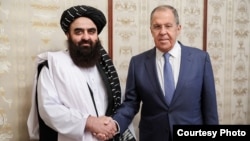
Russia’s Supreme Court removed Afghanistan's militant Taliban rulers from its list of banned terrorist groups in a step toward recognizing the group that seized power in 2021 as international forces withdrew from the war-torn country.
Russian state news agencies said that in its ruling on April 17, the Supreme Court sided with a petition from the Prosecutor-General's Office, a sign the move is a coordinated policy change with support from top legal and political authorities, who designated the Taliban as a terrorist organization more than 20 years ago.
The suspension of the terrorist designation does not amount to full diplomatic recognition of the Taliban government.
Amid poverty and unrest in the country, the Taliban rulers have made moves to open ties with the rest of the world. But Western nations have been reluctant to engage with the extremist group amid complaints of widespread human rights violations, especially against girls and women.
Russia has not officially recognized the Islamic Emirate of Afghanistan, nor has it re-established ambassadorial-level relations. However, the April 17 ruling may lay the legal groundwork for expanded cooperation, investment, and potentially future recognition.
Russia officially banned the Taliban in 2003, aligning itself with international counterterrorism standards and reflecting concerns over jihadist movements in Central Asia and Russia's North Caucasus region.
Still, Russia has been one of the few major powers to keep its embassy in Kabul operational during the Taliban regime.
Russian diplomats, intelligence officials, and even business interests have since engaged with Taliban authorities — especially on regional security, counter-narcotics, and economic cooperation, such as potential mining and energy projects.
Russia Looking To Gain Influence
With Moscow eager to strengthen its influence in Central Asia amid growing competition with the West and China’s expanding footprint, Afghanistan has become a critical piece of the regional chessboard.
The court’s decision may also be linked to Moscow’s concerns about the Islamic State–Khorasan group, which has claimed responsibility for several high-profile attacks in Afghanistan, Pakistan, and even within Russia itself — including the deadly Crocus City Hall terrorist attack in March 2024.
Some analysts say Russian officials likely view the Taliban as a lesser evil or even a potential security partner.
The suspension of the ban may spark unease in Central Asian countries such as Tajikistan, which has historically viewed the Taliban with deep suspicion.
While some regional governments have engaged with Kabul out of necessity, fears remain about Taliban-inspired radicalization, border security, and cross-border militancy.
In September 2024, Kyrgyzstan removed the Taliban from its list of banned terrorist organizations, aligning with similar moves by neighboring Kazakhstan earlier that year.
Another Central Asian nation, Uzbekistan, has been at the forefront of engaging with the Taliban, emphasizing economic cooperation and regional connectivity.
China is also cautiously increasing its engagement with the Taliban, including through infrastructure and investment talks under the Belt and Road Initiative.
- By Ray Furlong and
- Current Time
Macron Says Paris Talks A Chance For ‘Convergence’ On Ukraine Peace Efforts
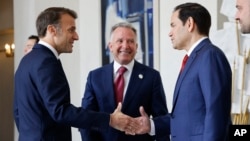
French President Emmanuel Macron said a meeting in Paris of high-level officials from key European countries, the United States, and Ukraine were "a very important occasion for convergence."
The gathering on April 17 came days after the latest direct talks between Washington and Moscow that are aimed at ending the war between Russia and Ukraine, Europe's biggest conflict since the end of World War II.
"I think everybody wants to get peace for sure, and a robust and sustainable peace," Macron said in English at the beginning of several hours of talks.
The talks were a first chance for face-to-face meetings between senior European and Ukrainian leaders and US special envoy Steve Witkoff since his latest meeting with Russian President Vladimir Putin last week.
Moscow has failed to sign on to a broad cease-fire agreement put forward by US President Donald Trump, which Ukraine has already accepted. Russia has said any deal is conditional on Kyiv stopping its mobilization efforts as well as an end to the flow of Western arms to Ukraine. Those demands have been rejected by Ukraine.
Still, Witkoff recently told Fox News that he believes a peace deal was “emerging.”
He said he had heard “what Putin’s request is to have a permanent peace here,” adding that it was “about these so-called five territories.” This refers to parts of Ukraine at least partially occupied by Russia, which Moscow claims.
As the Paris talks continued, Ukrainian President Volodymyr Zelenskyy told journalists in Kyiv that Witkoff was "consciously or unconsciously, I don't know, spreading Russian narratives."
Kremlin spokesman Dmitry Peskov said that while Washington was working for peace, "from the Europeans, we see a focus on continuing the war."
Meanwhile, there has been no letup in deadly Russian missile strikes on Ukrainian cities in recent days. On April 16, a Russian drone attack on Dnipro killed at least five people.
"Russia uses every day and every night to kill. We must put pressure on the killers... to end this war and guarantee a lasting peace," Zelenskyy said in a Telegram post.
The talks also included US Secretary of State Marco Rubio, Ukrainian presidential envoy Andriy Yermak, British National Security Advisor Jonathan Powell and Jens Ploetner, a senior adviser to German Chancellor Olaf Scholz.
Political analyst Anton Penkovsky told RFE/RL’s Current Time that he did not expect big decisions to be taken.
“I think we can expect some technical questions, some decisions on the already announced 30-day cease-fires relating to the Black Sea and energy infrastructure, which have not been observed. I think we could see some news on extending [them],” he said.
Prior to Rubio’s arrival on April 17, the US State Department said the talks would aim “to advance President Trump’s goal to end the Russia-Ukraine war and stop the bloodshed.”
Yermak wrote, after landing in Paris, “we are working on important issues for the security of Ukraine and the whole of Europe.”
While Washington has tried to push ahead cease-fire talks with Kyiv and Moscow, European countries have focused on supporting Ukraine and planning for a possible military mission to shore up any cease-fire deal.
European efforts to get a US commitment to provide a “backstop” to such efforts have met with a cool response from Washington.
“Right now, the United States wants to wind down most, if not all, of its foreign policy in Europe and focus exclusively on its domestic issues,” Penkovsky said.
Russian Attack On Dnipropetrovsk Kills At Least 5, Including Child, Injures Dozens

Russian drone and artillery attacks killed at least five people, including a child and an elderly woman, and injured dozens of others in the southeastern Ukrainian region of Dnipropetrovsk.
"It was a difficult night in Dnipro... Three people were killed by this Russian attack, and among them was a girl, Veronika, only 17 years old," Ukrainian President Volodymyr Zelenskyy said.
Local Governor Serhiy Lysak later updated the death toll to five, and added that 31 people, including five children, were injured in the attack on the city of Dnipro late on April 16. Sixteen people were being treated in hospital.
The attack ignited several fires, according to Dnipro Mayor Borys Filatov, who said one strike came within 100 meters of the city’s municipal offices. He also said at least 15 dwellings had been damaged along with a student residence, an educational institution, and a food-processing plant.
Two more people were killed in Nikopol, a town only 5 kilometers away from Russian forces in the partially occupied Zaporizhzhya region. Five were reported injured.
"A shop, a cafe, private houses, outbuildings, a car, and a bus stop were damaged," Lysak said.
Pictures posted online showed a large blaze and firefighters working at the scene as well as gutted vehicles and buildings with smashed windows and damaged facades.
Elsewhere, a deadly Russian rocket attack killed at least one person in the eastern Ukrainian city of Konstyantynivka.
The city was targeted again by shelling on April 17 while an RFE/RL correspondent was speaking with locals whose homes had been damaged.
In the northeastern Kharkiv region, Governor Oleh Synyehubov said a Russian missile attack injured seven people in the town of Izyum. The town was captured by Russian troops in the early days of Russia’s full-scale invasion in February 2022 but was retaken by Ukrainian forces later in the year.
Meanwhile, Russia's Defense Ministry said it's air defense systems destroyed or intercepted 71 Ukrainian drones over six Russian regions overnight, with 49 of the drones downed in the Kursk region.
It was not possible for RFE/RL to verify the claims.
Last week, the head of Ukrainian military intelligence, Kyrylo Budanov, said on Telegram that Russia's ballistic missile strike on Palm Sunday that left 34 people dead in Sumy was partly launched from the Kursk region.
Yan Matveyev, a Russian military analyst, said that Russia's 112th brigade -- one of those accused by Ukraine of carrying out the attack on Sumy -- does indeed have a dozen Iskander-M missiles.
"They can be stationed in different places and move around all the time.... Now they are also responsible for the whole northern direction and fire at various objects," Matveyev said in an interview with Current Time.
Zelenskyy met with defense industry representatives in Kyiv on April 16. He said Ukraine now produces 40 percent of the weapons used on the front line.
"Our defense industry is already manufacturing more than a thousand types of weapons: from artillery shells to missiles and long-range weapons, to our drones," Zelenskyy said during the meeting, according to his office.
Zelenskyy noted that Ukraine's growing defense sector now employs around 300,000 people and is attracting an increasing number of international partners. Domestic successes include the rapid rollout of new combat drones, artillery production, and Ukraine's own missile systems. Though the items currently are in limited quantities.
Matveyev says the Ukrainian-produced drone 'Lyutiy' could have taken part in recent attacks inside Russia.
"It is probably the most massive Ukrainian drone for attacks on some distant objects... It flies slowly, so it's not a big problem to shoot it down if the air defense calculations are ready," he said.
Despite the progress, Zelenskyy acknowledged Ukraine remains heavily reliant on foreign arms deliveries, including tanks, armored vehicles, and advanced air defense systems.
Last week, he proposed a $15 billion deal with the United States for 10 Patriot air defense systems to bolster Ukraine’s protection against Russian missile strikes.
The Ukrainian parliament has voted to extend martial law and a mobilization order by another 90 days. The two corresponding motions submitted by Zelenskyy received the required two-thirds majority. Once signed by Zelenskyy, martial law will apply until August 6. It was due to expire on May 9.
Former President Petro Poroshenko, who is Zelenskyy's main rival, accused the government of rushing the extension through parliament.
Martial law is "being used not only for the defense of the country, but also for the establishment of an authoritarian regime," Poroshenko claimed on social media.
The Ukrainian government first imposed martial law and ordered mobilization following Russia's full-scale invasion on February 24, 2022.
There has been speculation that Zelenskyy could call elections, which cannot be held under martial law. Conscripts aged between 18 and 60 are barred from leaving the country under the law.
With reporting by Reuters and dpa
Serbia Approves New Government Led By Duro Macut, A Doctor
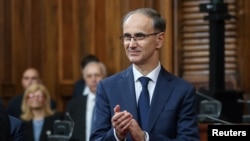
Serbia has appointed a new government led by Duro Macut, a doctor and academic with no prior political experience, amid street protests that have rocked the Balkan nation.
The 61-year-old Macut was backed by 153 lawmakers in the 250-seat parliament during the April 16 vote. Macut's cabinet will include 30 ministers, including 10 newcomers. A total of 199 MPs voted, with 46 against.
Macut was handpicked by President Aleksandar Vucic, who has led the country since 2017. Vucic’s Serbian Progressive Party (SNS) controls 112 seats in parliament.
In his inaugural address, Macut said Serbia was "tired of division and blockades" and called for the "harmonization of society" through dialogue, tolerance, and a shared value system. He announced that his immediate priority would be ensuring the normal functioning of schools and universities.
The new cabinet follows the resignation of former Prime Minister Milos Vucevic, who stepped down on January 28, a day after members of the SNS assaulted a student protester in Novi Sad. Vucevic is president of the SNS. His resignation was formally acknowledged by parliament on March 19.
Vucevic's departure came amid growing anti-government protests spearheaded by students who are demanding accountability for the deaths of 16 people in the collapse of a railway station canopy in Novi Sad on November 1.
The protests over the accident have evolved into a broader movement opposing what demonstrators say is the crumbling rule of law and systemic corruption under Vucic, who experts say rules the country with a tight grip. The students have blocked dozens of faculties across Serbia since late November.
Macut, a respected endocrinologist, is deputy director of the Clinic for Endocrinology, Diabetes and Metabolic Diseases at Serbia's University Clinical Center. He is also a full professor at the University of Belgrade Medical School and lectures in Athens and Skopje.
He heads the Serbian Society for Reproductive Endocrinology and is an internationally recognised expert on polycystic ovary syndrome. Macut currently serves on the Executive Board of the European Society of Endocrinology.
Zoran Stojiljkovic, a professor at the Faculty of Political Sciences, sees the appointment of Macut as little more than a tactic by Vucic to buy time.
"The government is responsible for triggering this political and social crisis, and what it's offering as a way out doesn’t guarantee either stability or permanence," he told local media.
Bojan Klacar, executive director of the Centre for Free Elections and Democracy, said Macut’s nomination is a direct response to the student protests that remain “very much alive and vital.”
“If the protests begin to subside, this choice could benefit the ruling Serbian Progressive Party,” Klacar said. “In that case, the opposition and those supporting the students will struggle to justify why they wouldn’t sit at the table with such a prime minister.”
He added that Macut, a university professor, should be a “credible interlocutor” for the protesting students.
Kyiv Cites 'Significant Progress' In Talks With US On Partnership Deal, Rare Earth Minerals

Ukrainian Economy Minister Yulia Svyrydenko said there has been "significant progress" in negotiations with the United States toward a comprehensive economic partnership agreement that includes a deal on rare earth minerals.
In a post on X published on April 16, Svyrydenko said that while teams from both sides will continue working on specific points in the agreement, "a lot has already been worked out."
"We have now agreed with the American side to record this progress in the relevant memorandum of intent. We are preparing to complete the formalization of the agreement in the near future," she wrote, giving no further indication of the timing.
US President Donald Trump's administration has made securing rare earth supply chains a strategic priority, especially as global competition with China intensifies. The deal with Ukraine is seen in Washington as a way to diversify critical mineral sources and reduce US dependency on Chinese exports.
It's also seen by Trump as a way to be compensated for billions of dollars in support Washington has supplied to Ukraine in its war with Russia, sparked by Moscow's February 2022 full-scale invasion of its neighbor.
Talks on a cease-fire in the conflict have been occurring in parallel to the economic partnership talks.
Svyrydenko said that once finalized, the draft will require ratification by the Ukrainian parliament, the Verkhovna Rada to ensure the agreement aligns with Ukraine's long-term national interests.
"It [the agreement] will create opportunities for investment and development in Ukraine and establish conditions for tangible economic growth for both Ukraine and the United States," she said.
Svyrydenko's statement came a day after President Volodymyr Zelenskyy described recent US-Ukraine discussions as "positive," particularly in the context of a parallel, high-stakes negotiation over critical minerals -- strategic resources essential to modern technologies and national security.
Zelenskyy confirmed that multiple meetings were ongoing and encouraged continued public attention.
However, the negotiations have come against the backdrop of lingering tensions between Trump and Zelenskyy.
On March 30, Trump publicly accused Zelenskyy of attempting to walk away from the critical minerals deal, warning such a move would trigger "serious consequences."
The accusation followed a report by Bloomberg News that Ukraine was preparing to propose key changes to a draft agreement, particularly regarding rare earth minerals -- resources vital for electronics, defense systems, and renewable energy technologies. The revisions reportedly promise to increase American investments in Ukraine's mining sector.
According to The Financial Times and Bloomberg, the United States is pushing for a new strategic framework that would secure access to Ukraine's energy assets and deepen bilateral cooperation across critical sectors.
As Kyiv and Washington edge closer to formalizing both the broader economic partnership and the strategic minerals agreement, these talks could reshape Ukraine's postwar economy and the geopolitical balance of energy and technology supply chains in Europe and beyond.
With reporting by Bloomberg and Financial Times
- By RFE/RL
Iran Says It's Ready To Address US Concerns But Not Negotiate Nuclear Enrichment

Tehran is ready to ease US concerns over its nuclear activities but scrapping uranium enrichment is off the table, Foreign Minister Abbas Araqchi said as the two sides prepare for a second round of talks this weekend over Iran's nuclear program.
Araqchi told reporters after a weekly cabinet meeting in Tehran on April 16 that Iran's enrichment is a "real, accepted matter."
"We're ready to build confidence in response to possible concerns, but the principle of enrichment is nonnegotiable," he said, days ahead of the second round of talks with the United States on April 19, which Iran's state broadcaster announced would take place in the Italian capital, Rome, and not in Oman as previously thought.
Araqchi's comments came in response to a statement by US Special Envoy Steve Witkoff on April 15 saying Iran "must stop and eliminate its nuclear enrichment and weaponization program."
But hours earlier, Witkoff had told Fox News that the Donald Trump administration was seeking to cap Iran's uranium enrichment at 3.67 percent -- the limit set in the 2015 nuclear deal that Trump abrogated in 2018.
"Iran must not possess nuclear weapons, and it should not enrich uranium beyond 3.67 percent," Witkoff said.
His apparent reversal came after a conservative backlash on social media, with the administration being accused of repackaging the 2015 deal, which is formally known as the Joint Comprehensive Plan of Action (JCPOA).
"We applaud Special Envoy Witkoff's statement," wrote Mark Wallace, chief executive of United Against Nuclear Iran (UANI), a US-based nonprofit, after Witkoff changed his tone.
"It is clear under the Trump Doctrine that Iran must verifiably dismantle its nuclear program or the US and Israel will do so," said Wallace, a former US diplomat.
Araqchi, who will travel to Moscow on April 17, noted Witkoff had made "different comments" since the conclusion of the first round of talks but added Washington's "true position must be clarified at the negotiating table."
Trump has made it clear Iran cannot be allowed to acquire nuclear weapons, but he has not explicitly commented on whether that involves curbing Iran's nuclear program or fully dismantling it. In the meantime, his administration has been sending out mixed messages.
Quoting an unnamed US official, the Axios news website on April 16 attributed the lack of clarity to ongoing internal discussions.
"The Iran policy is not very clear mainly because it is still being figured out. It is tricky because it's a highly politically charged issue," the official said, according to Axios.
Former US diplomat and nonproliferation expert Mark Fitzpatrick said a deal would be unlikely unless the Trump administration relaxed its position.
"Trump would have to change the position of no enrichment to a position of low enrichment," he told RFE/RL's Radio Farda.
"Iran is not going to go to a 'no enrichment' and it's certainly not going to accept it, but it would be willing to negotiate the levels of enrichment. And yes, this would be like the negotiations under the JCPOA," he added.
With reporting by Hannah Kaviani of RFE/RL's Radio Farda
Serbian Student Cyclists Reach Strasbourg, Ending Trek To Highlight Anti-Government Protests
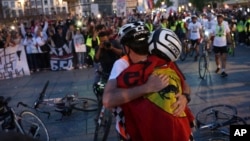
Serbian university students who have been on a cycling tour across Europe for nearly two weeks to draw attention to protests against corruption in their home country arrived on April 15 in Strasbourg, France, seat of the European Parliament.
Around 80 student cyclists rode on to Strasbourg's main square and were greeted with shouts of "Pump, pump" before bottles of champagne were uncorked in celebration.
The group had left Novi Sad on April 3 and traveled more than 1,300 kilometers through heavy rain and chilly temperatures to show European institutions the "perseverance and dedication of students in the fight for justice" in Serbia, they said.
The students say their fight is being overlooked in much of Europe and by the news media in Serbia, which is seeking membership in the European Union but has been accused of backsliding in democratic freedoms and the rule of law.
The students declared their cycling tour a success after being well-received in Budapest, Vienna, and in towns along their route through Hungary, Slovakia, Austria, and Germany on their way to France.
“I think that this protest action is a full success,” one of the cyclists said after arriving in Strasbourg on a live N1 TV broadcast. “I think we have woken up Europe.”
The EU's enlargement chief backed the protesters' calls to tackle corruption and boost the rule of law.
"Serbia has to be brought back on the European track," Commissioner Marta Kos said in an interview with the European Newsroom consortium.
"What we are demanding from Serbia on the way of the EU accession is nearly exactly the same as what the protesters in Serbia are demanding," she said, pointing to issues such as "rule of law, anti-corruption, and public procurement."
The cyclists said they wanted to draw attention to the deadly collapse of a railway station cement canopy in Novi Sad in November that killed 16 people. The incident triggered nationwide demonstrations as protesters blamed the government for corruption and poor oversight.
The students are demanding justice for the victims of the collapse and an end to government pressure and violence against protesters.
They have called on the government to release all documents related to construction work at Novi Sad's railway station. The authorities claim they have made public all “available documents,” but protesters reject that claim.
Almost daily street demonstrations have rattled the Balkan nation. In late January, Prime Minister Milos Vucevic resigned.
President Aleksandar Vucic on April 6 named Djuro Macut, a little-known medical professor, as prime minister-designate amid the political crisis.
Vucic, one of the founders of the ruling Serbian Progressive Party, which has been in power since 2012, presented it as a "movement of great change." But he has been accused of stifling democratic freedoms while maintaining close links with Russia and China.
Vucic and his pro-government media have accused the students and their professors of working with unidentified Western security services against the state to remove him from power together. He has not provided any evidence for his claims.
Student-led protesters on April 14 temporarily blocked the entrances to national broadcasters Radio Television of Serbia (RTS) in Belgrade and Radio Television of Vojvodina (RTV) in Novi Sad, accusing the broadcasters of ignoring their movement.
With reporting by AP and AFP
US Lifts Sanctions Against Member Of Orban's Cabinet
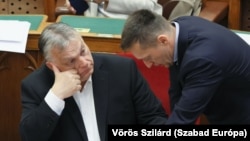
The United States on April 15 lifted sanctions imposed in January on the head of Hungarian Prime Minister Viktor Orban's cabinet, Antal Rogan, over accusations of corruption and cronyism.
A statement posted on the Treasury Department website said Rogan had been deleted from the sanctions list.
Secretary of State Marco Rubio on April 15 spoke with Hungarian Foreign Minister Peter Szijjarto and informed him of the move, State Department spokesperson Tammy Bruce said in a statement.
Rubio told Szijjarto that Rogan had been removed from the Treasury Department’s Specially Designated Nationals and Blocked Persons List, Bruce said, noting that continued designation was inconsistent with US foreign policy interests.
The two also discussed strengthening US-Hungary alignment on critical issues and opportunities for economic cooperation, Bruce said.
Orban and his Fidesz party have been among US President Donald Trump's most vocal supporters in Europe.
Washington earlier this year announced sanctions against Rogan for alleged involvement in corruption, saying he had “used his role to enrich himself and those loyal to his party,” the department said in a news release on January 7.
Rogan “orchestrated schemes designed to control several strategic sectors of the Hungarian economy” and skimmed the proceeds from the sectors for himself and loyalists to the Fidesz party, the department said when it announced the sanctions.
The US ambassador to Hungary at the time, David Pressman, said the “systemic corruption...is affecting Hungary's decision-making on issues that impact the security of the United States of America and our allies."
Pressman stepped down before Trump was inaugurated on January 20.
Orban’s government, which had called the sanctions against Rogan a "personal revenge of the ambassador," hailed the April 15 announcement that sanctions had been lifted as a "clear sign that the winds have changed in Washington."
Government spokesman Zoltan Kovacs said on X that the change "confirms a shift in US policy with President Trump's return, undoing what Hungary sees as unjust actions taken out of spite."
The United States previously said that throughout Rogan's tenure as a government official, he had orchestrated Hungary’s system for distributing public contracts and resources to cronies loyal to himself and Fidesz.
He was designated under the Global Magnitsky Human Rights Accountability Act, which targets perpetrators of serious human rights abuses and corruption around the world.
The department noted in January that public sector corruption in Hungary has been worsening for more than a decade, leading to Hungary receiving the lowest score of any European Union member state on Transparency International’s 2023 Corruption Perceptions Index for the second consecutive year.
It also said whistleblowers in Hungary have criticized the government for operating a kleptocracy with a notable lack of transparency and equity in public and private expenditure deals made between administrators such as Rogan and loyalist business leaders.
"Hungary’s failure to address transparency issues in its public procurement mechanisms has most recently led to a loss of over 1 billion Euros in future funding from the European Union, disadvantaging Hungarian citizens,” the department said in announcing the sanctions against Rogan.
With reporting by AFP and Reuters
Russian Journalists Handed Prison Terms For Alleged Ties To Navalny
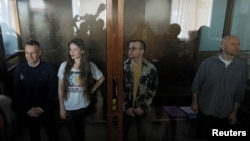
Four Russian journalists have been sentenced by a Moscow court to 5 1/2 years in prison each for their activities linked to the late opposition leader Aleksei Navalny’s Anti-Corruption Foundation (FBK), which Russian authorities have designated as an "extremist organization."
The journalists -- Antonina Favorskaya, Sergei Karelin, Konstantin Gabov, and Artyom Kriger -- were convicted after a closed-door trial for their contributions to YouTube channels affiliated with FBK before it was outlawed in 2021.
The court on April 15 also barred the defendants from working as journalists for three years after their release.
After the verdicts and sentences were pronounced, the journalists' supporters started applauding and chanting: "Guys, you are the best!"
Kriger told supporters: "Everything will be okay, guys, do not worry, sooner or later all this will be over. Those who sentenced me will for sure be convicted themselves."
Bailiffs then started shouting at Kriger and cleared the courtroom.
All four journalists have repeatedly denied the charges.
The trial, which started in early October 2024, was held behind closed doors with supporters and journalists only allowed to attend the reading out of the verdicts and sentences.
Favorskaya and Kriger are reporters for the independent outlet SOTAVision, itself labeled a “foreign agent” by the Russian government.
'Independent Journalist Is Equated With Extremism'
Gabov and Karelin are freelance journalists who have contributed to major international media organizations, including Reuters and the Associated Press. Gabov has also contributed to Radio Liberty, Radio Free Europe's Russian-language service.
"I have never been a member of any political party and always considered it my duty as a journalist to objectively express the opinions of people with diverse views to help them be heard by the authorities," Gabov said in his final statement to the court.
“Independent journalism [in Russia] is equated with extremism.”
Karelin stressed in his final statement that the channel he was accused of working with wasn't outlawed as extremist at the time he contributed to it.
“Remorse is considered to be a mitigating circumstance. It’s the criminals who need to have remorse for what they did. But I am in prison for my work, for the honest and impartial attitude to journalism, FOR THE LOVE for my family and country,” he said in a written statement to the court.
The prosecution had sought up to six years in prison for each defendant. The trial was closed to the public, with authorities citing warnings from Russia’s Center for Combating Extremism, which claimed the FBK might attempt to disrupt proceedings.
The sentencing is part of a broader crackdown on journalists and former associates of Navalny, who died in prison in February 2024 under disputed circumstances while serving a 19-year sentence on charges widely regarded as politically motivated.
His death prompted international outrage and intensified scrutiny of Russia’s treatment of political prisoners and independent media.
Human rights organizations report that dozens of journalists are currently detained in Russia on similar charges, as the government continues to tighten control over dissenting voices.
Ukraine Replaces Regional Governor As Sumy Buries More Victims Of Russian Strike

Ukraine's government approved the dismissal of the military governor of the Sumy region for holding an award ceremony that appears to have been the target of a Russian air strike that killed 35 people, including two children.
Volodymyr Artyukh, the head of the Sumy Regional Military Administration, is expected to be relieved of his position once President Volodymyr Zelenskyy signs the approval, confirmed by the cabinet on April 15, government spokesman Taras Melnychuk said.
Artyukh will be replaced by Oleh Hryhorov, a former law enforcement official.
The decision comes amid a public outcry over an apparent military award ceremony held in Sumy just hours before the strike on April 13.
Russian forces launched two ballistic missiles -- one equipped with cluster munitions, according to Ukrainian officials -- at the center of the city, injuring more than 100 people along with the 35 deaths.
Residents of Sumy on April 15 buried more of those killed in the attack in emotional ceremonies.
"My sister died in the attack. If I was handed a gun, I’d start killing Russians on the [front line]. I’m fed up with them. Please, stop. I can’t take it anymore," said one grief-stricken relative at the funeral of two of the victims.
A 'Horrible Thing'
Officials from around the world condemned Russia and its president, Vladimir Putin, for the attack, which fell on Palm Sunday as many in the city marked one of the most religious days in the Christian calendar.
US President Donald Trump, who has made ending the war a top foreign policy priority since taking office less than three months ago, called the Russian strike on Sumy a "horrible thing."
But Bloomberg News reported on April 15 that the United States told its allies that it won't endorse a statement condemning Russia in the attack because it does not want to impact a peace process it is trying to bring the parties to sign to end Europe's largest conflict since World War II.
NATO chief Mark Rutte, in Odesa on April 15, said the alliance's support is "unwavering."
Calls for the Artyukh removal came after Artem Semenikhin, mayor of Konotop—the second-largest city in the Sumy region -- publicly accused the governor of organizing the ceremony honoring soldiers from the 117th Territorial Defense Brigade at the Sumy Congress Center.
"He [Artyukh] held an award ceremony for our heroes from the 117th Brigade right here. Everyone knows about it. It's not true that nothing was happening. It was. Thank God no soldiers were hurt -- they were in a shelter. But [the Russians] used a cluster bomb to cause as many civilian casualties as possible," Semenikhin said in a video statement recorded on the day of the attack.
In a subsequent interview with public broadcaster Suspilne, Artyukh acknowledged he had attended the event but denied organizing it.
"It wasn't my initiative. I was invited," he said.
The Russian Defense Ministry claimed the target of the strike was a "Ukrainian command staff meeting," while Russian Foreign Minister Sergei Lavrov alleged, without providing evidence, that NATO military personnel were present.
Ukrainian authorities have neither confirmed nor denied the presence of an army event in Sumy the day of the attack.
Ukrainian lawmaker Maryana Bezuhla stated on social media that there had been a leak of information concerning the ceremony.
EU Looks To Tighten Visa Rules: 61 Countries Face Visa-Free Travel Overhaul
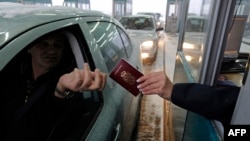
The European Union looks set to sharpen its visa suspension mechanism later this year, making it easier for Brussels to revoke visa-free travel for citizens of the 61 countries that currently enjoy it -- including all the EU hopefuls in the Western Balkans, as well as Georgia, Moldova, and Ukraine.
The proposal to list more reasons for suspending visa-free travel was initiated by the European Commission back in 2023, and the Council of the EU -- which represents the 27 member states –- already adopted its position on the matter a year ago. However, due to the European Parliamentary elections in June 2024 and a heavy backlog of legislation, the European Parliament only recently obtained its negotiation mandate.
Last week, the first trialogue between the three institutions took place on the proposed legislation, with the goal of reaching an agreement during the Polish Presidency of the EU Council, which runs until the end of June. If all goes well, the new legislation should be up and running in early autumn.
Why Is This Happening Now?
Essentially, the bloc is becoming much more hard-nosed about visa liberalization, reflecting a broader shift: first, to combat any form of illegal migration into the EU; and second, to potentially use visa policy as a political tool to pressure third countries.
Visa liberalization -- which in this case includes all EU member states except Ireland, as well as non-EU countries Iceland, Liechtenstein, Norway, and Switzerland -- has long been one of Brussels' most significant political carrots, particularly for countries in its neighborhood.
It allows nationals from third countries to visit the EU for up to 90 days in any 180-day period without a visa. Kosovo was included on the list in early 2024 and Georgia and Ukraine in 2017 -- moves that were celebrated in all these countries.
To threaten to withdraw the privilege can therefore be seen as a real stick.
The current suspension mechanism, in place since 2018, can be triggered in cases of clear abuse -- for example, a surge in third-country nationals overstaying the 90-day limit or using the liberalization of travel to seek asylum in the EU. So far, the bloc has only suspended visa liberalization once: first temporarily, then permanently, for the South Pacific nation of Vanuatu.
So, what changes are likely in store? Broadly speaking, there are four key areas of change, as Brussels aims to make the visa suspension mechanism a more credible deterrent. First, visa liberalization could be suspended if there is a perceived lack of alignment between a visa-free third country and the EU's general visa policy.
This was the case in 2022, for example, when Serbia allowed visa-free travel for citizens of countries such as Burundi, India, and Cuba. Brussels suggested that many of those individuals were using Serbia as a backdoor into the EU. After pressure from the European Commission, Belgrade dropped some of these arrangements. Under the proposed legislation, however, such behavior could be punished more readily.
Hybrid Threats
Another reason for suspending visas is so-called hybrid threats. While still rather theoretical, this provision is inspired by cases such as Russia and Belarus, which the EU has accused of transporting migrants from Africa and Asia to EU frontiers, like Poland and Lithuania's borders.
Now, the EU's visa facilitation agreements with both Moscow and Minsk have already been suspended for several years, due to Russia's invasion of Ukraine and Belarusian strongman Aleksandr Lukashenko's crackdown on the opposition. However, if another visa-free country attempts a similar tactic, the new mechanism could be triggered in response.
Thirdly, if a country operates an investor citizenship scheme -- allowing individuals to buy citizenship without any genuine link to that country -- then visa liberalization with the EU could also be halted in the future.
However, the fourth new ground for suspension is perhaps the most interesting one, as it relates to the EU's political relations with third countries. The draft legislation states that the suspension mechanism can be triggered in cases of “serious human rights violations and abuses" or “serious breaches of international law and standards, including human rights law and noncompliance with international court decisions and rulings."
'Democracy Criterion'
If you ask EU officials, their reading has always been that a “democracy criterion" exists when it comes to visa liberalization -- but it has never been clearly spelled out what exactly this entails.
Another interesting and new aspect is that triggering the mechanism in this case should be the exclusive prerogative of the European Commission, after consultation with EU member states, as it deals with the external relations of the bloc.
Ultimately, however, it would still be up to the member states -- via a qualified majority -- to suspend visa liberalization with a third country. As EU officials put it, this remains “the nuclear option when all others have been exhausted," since the bloc is generally reluctant to penalize a country's entire population rather than its government.
That's why, earlier this year, the EU chose to suspend visa liberalization for Georgian diplomatic passport holders only, following democratic backsliding in the Caucasus country. Still, the option of targeting the entire population remains on the table -- and with the future expanded scope of the suspension mechanism, the bloc is clearly sharpening its toolbox.
- By RFE/RL
In Couched Comments, Khamenei Backs Iran-US Nuclear Talks
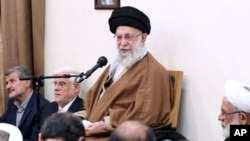
Iranian Supreme Leader Ayatollah Ali Khamenei appeared to back the continuation of nuclear discussions between Tehran and Washington, though he said he is neither "overly optimistic nor overly pessimistic" about the talks as they head toward a second round this weekend.
In his first public comments on the initiation of talks between Iran and the United States last weekend, Khamenei on April 15 said Iranian negotiators need to proceed with caution.
"A decision was made [to enter the talks] and has been carried out well in the initial steps. Going forward, we need to move carefully. Our red lines -- and the other side's -- are clearly defined," Khamenei said at a gathering of the senior members of the three branches of power.
"The negotiations may or may not lead to a result. We are neither very optimistic nor very pessimistic about these talks. Of course, we are very pessimistic about the other side, but we are optimistic about our own capabilities," he added.
Khamenei, who has the final say on all state matters, urged officials "not to tie the country's affairs" to the negotiations.
The first round of talks, which were mostly carried out indirectly, were held in Muscat on April 12, with the next round scheduled for April 19.
Italy was initially set to host the second round, but Iran later said Oman would continue to host the talks. None of the parties involved have elaborated on why the venue was changed.
Montenegro Releases Kazakh Rights Activist Smailova Awaiting Extradition Ruling
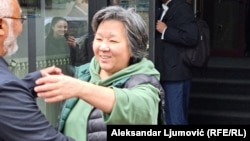
Kazakh women's rights activist Dinara Smailova was released by Montenegro's Higher Court in Podgorica on April 15, a day after she was arrested in the coastal town of Budva at the request of Kazakh authorities.
The court ruled that she may remain free while the extradition case proceeds, but ordered the confiscation of her passport to prevent her from leaving the country.
Authorities in Podgorica said on April 14 that Smailova's arrest was carried out "in accordance with an order by the investigative judge of the Higher Court," pending a review of the extradition request.
She is the founder of NeMolchiKZ (Don’t Be Silent KZ), a leading advocacy group fighting domestic and sexual violence in Kazakhstan.
Smailova applied for asylum in Montenegro in October 2023 and the decision is expected in the following months, her lawyer Dalibor Tomovic said on April 15.
"The request for asylum was submitted before the Kazakh government submitted a request for her extradition and the detention. So in the case that she is extradited to Kazakhstan, the fear of persecution is justified."
After leaving the court in Podgorica, Smailova thanked the supporters of NeMolchiKZ.
"You've been supporting us for about nine years, and that led to a women's revolution in Kazakhstan, where both men and women support our fight against domestic violence. Don't give up," Smailova said.
In December 2023, a Kazakh court issued a warrant for Smailova's arrest on charges of fraud, violating privacy, and spreading false information -- allegations that could carry a prison sentence of up to 10 years.
Human Rights Watch had earlier described the charges as "dubious" and part of a broader campaign to discredit her activism.
"Kazakh authorities appear to be on a fishing expedition, aggressively targeting Smailova in an effort to undermine her legitimate work defending victims of abuse," the group warned in February 2024.
Domestic violence remains a serious issue in Kazakhstan. According to local and international organizations, hundreds of women die every year as a result of domestic violence, and thousands more suffer abuse in silence due to societal stigma and institutional indifference.
In 2017, Kazakhstan decriminalized beatings and other acts causing "minor" physical harm, with the punishment reduced to an arrest, fine, or warning.
During a high-profile trial of a former government official who beat his wife to death, a law was introduced in April 2024 to close gaps in legal protections against domestic violence by criminalizing battery and intentional harm to health.
However, several human rights groups, including Smailova's organization, expressed concerns, saying the amendments do not go far enough.
Smailova's organization has provided critical support to survivors, including legal aid and public advocacy. Her outspoken criticism of the government's failure to protect women and children has drawn both praise and political backlash.
Montenegro's Council for Civilian Oversight of Police Work had cautioned Interior Minister Danilo Saranovic that Smailova would face persecution if returned to Kazakhstan.
The council likened Kazakhstan's increasing pressure on human rights defenders to similar tactics used by the Russian government and stressed that extraditing Smailova would contradict Montenegro's commitment to protecting human dignity and democratic values.
Smailova and her husband, fellow rights activist Almat Mukhamezhanov, have lived in self-imposed exile for several years and moved to Montenegro in 2023.
- By RFE/RL
Drone Attack On Kursk Kills 1, Injures 9, Russian Authorities Say
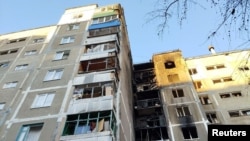
A Ukrainian drone attack killed an 85-year-old woman and injured nine people in the Russian city of Kursk near the border with Ukraine, regional authorities said on April 15.
"Kursk has been subjected to a massive enemy attack overnight," the Kursk regional administration said on Telegram.
Several apartments in a multistory residential building caught fire as a result of the drone attack, said acting Mayor Sergei Kotlyarov on Telegram. Residents have been evacuated to a nearby school, he added.
Drones also hit also an ambulance garage, damaging 11 vehicles, the region's administration said.
More than 20 blasts shook the city, according to Russia's Baza and SHOT Telegram channels, which often publish information from sources in the security services and law enforcement.
The reports could not be independently verified. There was no immediate comment from Ukraine. Both sides deny targeting civilians.
Ukrainian troops staged an incursion into the Kursk region in August, but Russian forces have been successful in recent months in pushing Ukrainian troops back across the border.
The attack on April 15 follows a Russian missile strike that left at least 34 people dead on April 13 in the Ukrainian city of Sumy, capital of the Sumy region, which borders Russia’s Kursk region.
Ukraine's state emergency service said two children were among those killed in the attack, which occurred as Ukrainians marked Palm Sunday. At least 117 others -- including 15 children -- were injured.
Officials from around the world condemned Russia and President Vladimir Putin on April 14.
European officials accused Russia of committing a war crime, while US officials from President Donald Trump to several Republican and Democratic Party lawmakers expressed horror at the death and destruction caused in the second major attack to kill Ukrainian civilians in 10 days.
With reporting by Reuters
Editors' Picks
RFE/RL has been declared an "undesirable organization" by the Russian government.
If you are in Russia or the Russia-controlled parts of Ukraine and hold a Russian passport or are a stateless person residing permanently in Russia or the Russia-controlled parts of Ukraine, please note that you could face fines or imprisonment for sharing, liking, commenting on, or saving our content, or for contacting us.
To find out more, click here.








































